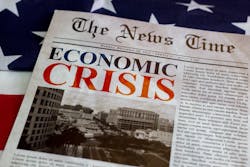The Housing Market Is Threatening to Push the U.S. Economy Into a Recession
For months now, the Federal Reserve has been working to fight inflation however it can. In the last week, Fortune reported that mortgage purchase applications are down 38% from last year, the lowest reading since 2014. As the Federal Reserve raises interest rates to fight inflation, homebuilders are cutting back, real estate firms are slowing down, and some regional housing markets, like Boise and Seattle, are already experiencing a price correction.
While the 2022 housing market downturn doesn’t mirror the 1981 or 2008 crash exactly, it shares traits of both. Just like in 1981, the 2022 housing market has crumbled due to a historic mortgage rate shock. And as in 2008, the current housing market has become detached from underlying economic fundamentals. While experts can agree that the housing market entered a downturn this summer, the numbers aren’t reflecting a Federal-induced recession just yet. And that is largely due to homebuilding.
If Wells Fargo's forecast—which also predicts a 5.5% decline in U.S. home prices in 2023—comes to fruition, it'd mean that the housing market downturn reaches a level that historically only occurs during recession.
While the housing downturn appears to be on a trajectory that could push the U.S. economy into recession, nothing is certain. If inflation eases, the Fed could pivot policy before a recession becomes locked in. There's also the theory that a significant drop in residential investment—which makes up 4.6% of GDP—wouldn't be as impactful on today's less housing dependent economy. While it's true that private investment topped out at a much higher share of GDP in 2005, we're actually slightly above the share seen in 1981. In other words, don't underestimate housing.
But "recession" or "no recession," the housing industry is clearly feeling the pinch of the tightening cycle. It's hard to see that changing anytime soon.
